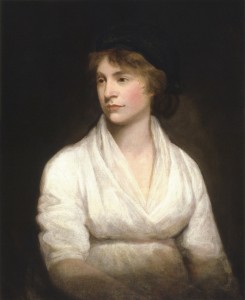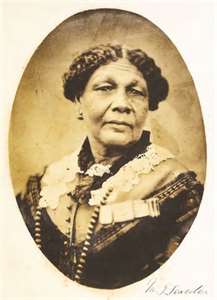Elementary Feminisms: How Useful is a Feminist Approach to History for Historians?
By Grace Corn
In today’s world, the very word “feminism” can stir up polarized reactions. As a feminist myself, I find it difficult to understand how feminism, in Pat Robertson’s words, “encourages women to leave their husbands, kill their children, practice witchcraft, destroy capitalism and become lesbians.” Nevertheless, this interpretation prevails throughout history, especially through its documentation. Feminism has many definitions—a fact outlined, and used to belittle the meaning of feminism, in many online definitions. For example, feminism is defined as “a word that has too many excessively long definitions.” However, feminism can also be considered “the doctrine advocating social, political, and all other rights of women equal to those of men.” Because there are multiple feminisms, it is difficult to find a universal understanding or truth of feminism. Feminism offers a challenging, yet interesting, approach to history. Definitions can be dangerous because one definition can silence other interpretations, but I would like to focus on the understanding of feminism as “advocating equal rights” as an approach to history.
What does an historical feminist approach involve? For some, a feminist history refers to the re-reading of history from a feminist viewpoint. Part of this approach is to explore and illuminate women’s perspective of history because it has been silenced or overlooked. The feminist approach involves investigating history for the role of women’s participation and influence (be that of female artists, writers, musicians, etc.). This is different from the history of feminism, which highlights the development of the feminist movement through a chronological narrative of movements and their ideologies. Likewise, women’s history, is not a historical approach, but rather outlines the role that women have played in history. It generally involves studying the growth of women’s rights throughout recorded history, examining individuals or groups of historical importance, and the effect that historical events have had on women. In contrast, a feminist approach to history is an analytic method.
One of the main advantages of using a feminist approach to history is its potential use as a weapon against misogyny. For example, we can see echoes of the suffragette’s methods of direct protest in the recent example of Malala Yousafzai’s demand for education in Pakistan. When we are attentive to the history of women’s oppression and the struggles against it, then we can learn and build from these histories.
For instance, after the death of early feminist Mary Wollstonecraft in 1797, her widower published her memoirs. Her writings revealed her unorthodox lifestyle and unconventional personal relationships, which inadvertently destroyed her reputation in Victorian society because she contradicted the accepted norms about woman. However, when feminist historians rediscovered her seminal work “A Vindication of the Rights of Women,” it became a widely recognized document and cornerstone for gender equality.
History and historical documents are important guides for feminism because they provide alternative understandings of gender relations today—we look back so as to go forward. If established gender roles and inequalities are revealed as socially constructed within a certain historical context, rather than occurring naturally or universally, then feminists are able to argue that gender inequalities are open to change. The late nineteenth and early twentieth centuries historians argued that women were largely absent from the history books. This insight led to an explosion in research that continues to impact women and gender relations. The historical works of English feminists such as, Alice Clark’s 1919 Working Life of Women in the Seventeenth Century, Barbara Drake’s 1920 Women and Trade Unions, and Barbara Hutchins’ 1915 Women in Modern Industry, all illustrate the importance of a feminist approach to history because they transformed historical writing, gender, and the historical understanding of the U.K.
A feminist approach to history shows that inequalities are not universal; instead, it rediscovers the lives, experiences, and ideas of women from historical obscurity. Importantly, feminism re-examines and potentially rewrites entire historical narratives of gender. Feminism has
transformed historical work and its understanding, and historians benefit from this approach. Another example of how using a feminist approach has rewritten history is the case of Mary Seacole. Her efforts caring for the sick and injured British troops were largely overlooked. Following her death she was forgotten for almost a century and it seems unlikely that Seacole was ever formally rewarded during her lifetime. However, recently she is being widely recognized and celebrated for her work, and her story has even been added to the English Primary school curriculum. In 2005, London’s Mayor, Boris Johnson, exclaimed upon learning about Seacole: “I find myself facing the grim possibility that it was my own education that was blinkered.” Not only does this outline how history has been neglectful, it highlights how a feminist approach to history broadens our understanding of historical events.
However, the place of feminism in history remains unstable and can limit the work of a historian. Unfortunately some historians are not feminists, and few are likely to embrace this approach because it criticizes their own profession. Often, feminist historians are less likely to speak freely because of a variety of factors. Before ‘Women’s History’ became a recognized historical field, we saw the work of feminist historians focus on women’s oppression, and as a result of the subject’s entrenchment into academia (and therefore its reliance on the establishment’s approval). Passionate, feminist statements have been in decline because the backlash to feminism has made it increasingly difficult for a historian to approach history from a feminist perspective without seeming to “blame men” or leaving out other identity categories. A feminist approach is often something to be frowned upon when searching for historical accuracy. Perhaps then a more appropriate approach to history would be to analyze a cross-section of subjects, such as race and class, alongside gender. By treating these subject matters on a level playing field and putting emphasis on the crossing of several factors, we can explore the similarities between systems of oppression instead. For this reason, this approach is far more useful to a historian than using singular one. Yet, for some, feminism has always been intersectional. Singular forms of feminism, however, can overshadow these intersectional analyses. For the feminist approach to remain useful it must avoid becoming a form of dominant feminism that oppresses other forms.
Nevertheless, there are problems that come with looking at history objectively. For a while I believed that a person’s gender should have no bearing on the recognition they receive for their achievements. This approach has its uses when looking at the development of humanity as a whole; however it completely omits something vital. For instance, if we were to look at the achievements of Rosa Bonheur, we can see how gender needs to be acknowledged. Bonheur is now recognized as one of the foremost female artists of the nineteenth century, however during her lifetime the highest praise she received was that she painted “like a man.”
As historians, we could look at her art and completely ignore her gender, but would this not completely undermine her achievements? Through being oblivious to her gender we are disregarding the fact that many women struggled against enormous odds to make a difference. In this respect, the slightly subjective nature of the feminist approach can offer a more complex historical narrative, as it takes into account female oppression in its historical context.
In conclusion, a feminist approach to history is incredibly useful to historians. Not only can this method recover unsung heroines, but it can also inspire change for the future. Feminism isn’t about getting revenge; it’s about engaging with the importance of differences and intervening when homogenous narratives begin to take root within society. It helps us to realize how histories of oppression continue to inform our social realities alongside how women and feminism has changed throughout history. In my opinion, the most significant action that the feminist approach can take is that of retrieving and saving the stories of those who were oppressed during their lifetimes and engaging with their experiences as a way to change the way we look at the future as well as the past.
************************************************
 Grace Corn is a student in the UK. She has just finished her first year of sixth form and is currently embarking on her second. Grace is continuing her studies in English literature, History, and Politics and is currently applying to study Politics at University. She aspires to become a serious journalist in the future. Feminism is something she feels extremely passionate about, not only in her everyday life, but also in her writing. Feminism, Grace explains, “is a part of who I am.”
Grace Corn is a student in the UK. She has just finished her first year of sixth form and is currently embarking on her second. Grace is continuing her studies in English literature, History, and Politics and is currently applying to study Politics at University. She aspires to become a serious journalist in the future. Feminism is something she feels extremely passionate about, not only in her everyday life, but also in her writing. Feminism, Grace explains, “is a part of who I am.”







Pingback: Sunday Morning Medicine | Nursing Clio